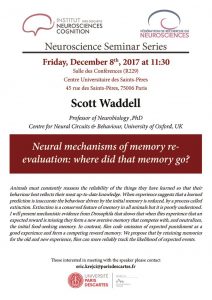 Neuroscience Seminar Series:
Neuroscience Seminar Series:
Friday, December 8th, 2017 , 11:30 am, Salle des conférences (3rd Floor), Centre Universitaire des Saints-Pères, 45 rue des Saints-Pères, 75006 Paris
Scott Waddell Ph.D.
Professor of Neurobiology
Wellcome Trust Principal Research Fellow
Centre for Neural Circuits & Behaviour
University of Oxford
Tinsley Building
Mansfield Road
OX1 3SR
Title:
Neural mechanisms of memory re-evaluation: where did that memory go?
Summary:
Animals must constantly reassess the reliability of the things they have learned so that their behaviour best reflects their most up-to-date knowledge. When experience suggests that a learned prediction is inaccurate the behaviour driven by the initial memory is reduced, by a process called extinction. Extinction is a conserved feature of memory in all animals but it is poorly understood. I will present mechanistic evidence from Drosophila that shows that when flies experience that an expected reward is missing they form a new aversive memory that competes with, and neutralizes, the initial food-seeking memory. In contrast, flies code omission of expected punishment as a good experience and form a competing reward memory. We propose that by retaining memories for the old and new experience, flies can more reliably track the likelihood of expected events.
Bio:
Scott Waddell studied biochemistry as an undergraduate at the University of Dundee, and researched cancer biology for his Ph.D. at the University of London. After postdoctoral study in the Department of Brain and Cognitive Sciences at Massachusetts Institute of Technology he spent 10 years leading a research group in the Department of Neurobiology at the University of Massachusetts Medical School. Scott moved to Oxford as a Professor of Neurobiology and founding member of the Centre for Neural Circuits & Behaviour in November 2011. His group has studied neural circuit properties of memory-directed behaviour in the fruit fly since 2001.
Scott is a Wellcome Trust Principal Research Fellow in Basic Biomedical Science, a member of EMBO, and was awarded the 2014 Liliane Bettencourt Prize for the Life Sciences.
Host:
Eric Krejci
